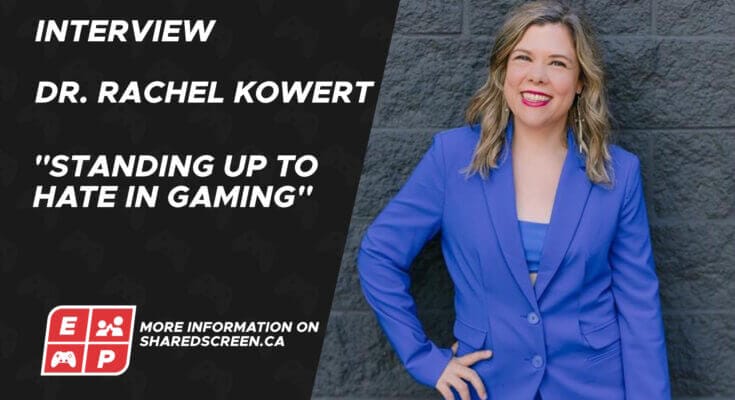At the Games for Change (G4C) Festival on July, the 19th 2023, we had the chance to meet and ask some questions to Dr. Rachel Kowert, a Research Psychologist, the Research Director of Take This and founder of Psychgeist, during the day.
On evenings, she’s an avid gamer who loves RPG (role playing game) video games, and the mother of 3 children.
Take This is a mental health nonprofit organisation, based in the US, decreasing stigma and increasing support for mental health in games. Take This has recently made a partnership with Games For Change.
The two organisations also started working on Raising Good Gamers.
Rachel Kowert’s talk at the G4C Festival
Dr. Rachel Kowert was at the festival to give a new talk with her colleague, Elizabeth Kilmer, about : Resilience in the Face of Hate: Standing up to Extremism in Gaming.
Here is the summary:
“Online video games provide innumerable opportunities for social connection and community building. While the ability to “play together” is one of the most influential mechanisms for positive change within games, it is also one of its greatest vulnerabilities. Some users are exploiting the community-building opportunities inherent in many games to organize, mobilize, and radicalize groups. Current moderation efforts are grossly ineffective at identifying these networks. This talk will discuss the state of this problem within games and present preliminary findings from a large-scale research project funded by the Department of Homeland Security focused on how the games industry is responding to these threats and what further tools are needed.”
In their talk, they showed the results of a study that was done in the United Kingdom and in the US. They interviewed a lot of video games players and these players in majority said that toxicity in games was normal. Most of the players also don’t try or play some games because of the bad reputation or toxicity of their online community.
Here are some of the results:
- 70% of gamers avoid games with toxic communities.
- 6 out of 10 players have abandoned a game due to toxicity
- 54% more revenue for games with healthy communities than games with toxic communities
- 6 out of 10 players choose not to spend money on a game because of toxicity.
Source: Positive Game Cultures are Good Business
I wanted to know more about these presented facts so I asked her about it during our interview.
Quick questions to Dr. Rachel Kowert
Psychology is an important part of Shared Screen, so I asked a few questions about her work and her talk.
Marc: Hello Rachel ! What brought you to psychology in the first place?
Rachel: “I always wanted a career in psychology. I don’t know, maybe I’m one of the strange ones. Just knew what they wanted to do, but my journey into psychology and games really came out of my masters program, which was 2008 ish, which was during the height of World of Warcraft. And so there was a lot of concern, around online gaming at this time and not a lot of research around it. So that’s how I came into that path !”
Marc: Did you always play video games?
Rachel: “I was. I was playing a lot of World of Warcraft. I was studying to become a therapist. I was doing my masters so I started to see lots of parents. They were saying : “My child is playing a lot World of Warcraft and I’m very concerned about how this is negatively impacting them“.
They assumed it was a negative impact and I was like, OK, and then after like the third or fourth one. I was like : “Do I need to be concerned because I play so much World of Warcraft right now and they seem to be very concerned that something bad is happening ?!” and there wasn’t any research into this.
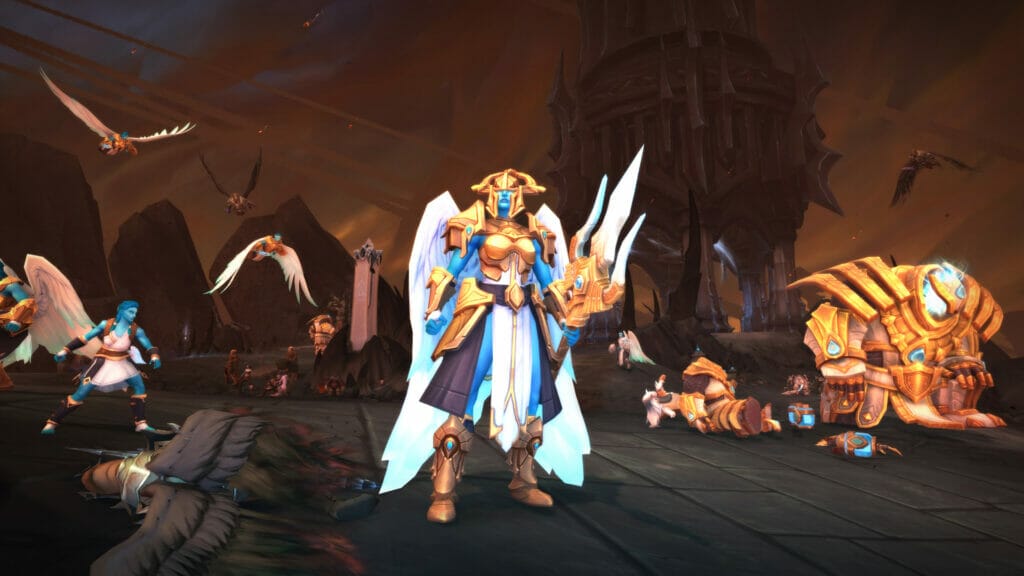
M: And so you were always into RPG and these kind of games ?
R: Yeah, RPG is my favorite genre of games, but I’ve played video games my whole life, you know from Mario. I got my first console when I was six, and then I found my love of Final Fantasy, which is a JRPG from a very early age. And that was kind of my favorite series.
M: So do people become weird when they play video games ? (Marc smiles)
R: I thought I would find a YES answer to that question because there was so much concern from the parents being like “Something is happening and it is bad !” But I looked at social skills and “Do social skills atrophy people playing games?” or “Do people who go to play games have less social skills than people who don’t like games?”
I looked at a bunch of different angles and there’s no differences between people who play online games and people who don’t. The only exception was there was a slight difference, in what we would call shyness, so there might be something there about, like hesitancy to engage socially, but in terms of ability: there’s no difference.
M: Were you always in touch with parents? I’m asking that because Shared Screen is dedicated to help them.
R: Yeah, well, when I was doing an internship just happened to be in a place that serves parents but parents have always been really my end goal.
A lot of times information in academia or research kind of gets stuck among other researchers and I knew that was a problem from the beginning and I wanted to make sure that we found this information and we got it to parents ! So I wrote a book of “A Parent’s Guide to Video Games” several years ago, which attempted to take all this information from the field and make it digestible to parents.
And then I became a parent and I realized parents don’t have time to read books, so then I made a YouTube channel of videos expressing that same kind of information. So I’m always looking for ways to engage with parents with this information, even though I don’t work with them directly because I’m primarily doing research.
M: How is it to parent children in the digital age? Is it difficult because they got access to Netflix, YouTube, video games ?
R: Oh gosh, it’s hard because when you work in the field, everyone thinks that you have all the answers. Yeah, I do not have all the answers. I do the best I can with the knowledge that I have. My kids absolutely engage with digital technology. I have found as I have multiple children that I’ve refined to my skills: they have access to any kind of games that are not connected to other people on the Internet.
They don’t play multiplayer games with strangers. They play Minecraft in their private realm like with their cousins, but I don’t let them engage with the wider world of the Internet.
And then YouTube Kids is great because it’s age appropriate and and and curated for them.
M: What brings you here at the Games for Change Festival ?
R: I feel like the Games For Change Festival is one of the only places you can go that talks about what games can be, that focus on what games can be instead of talking about what the games are not, which is usually what I do. So I love being in a place in which everyone has the same goal, thinking about the future of games.
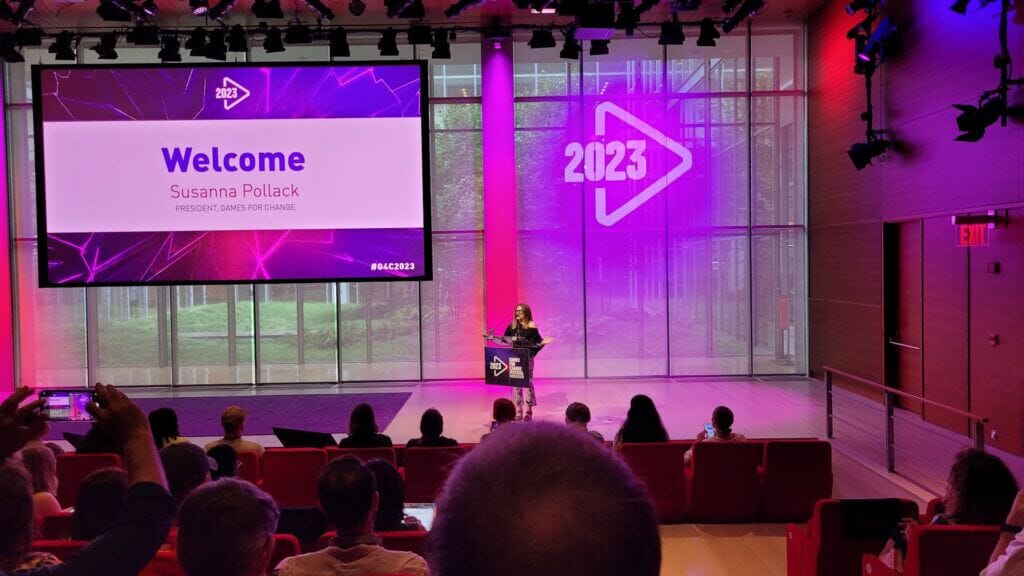
M: I was surprised by what you have shown during the talk . Because you said a lot of gamers were well accustomed to see toxic behavior and they thought it was normal and I was wondering what was the sample of the players you surveyed ?
R: Yeah so I don’t have that data offhand per say, but it was somewhere around 2000 game players. It was snowball sampling, which was you put a call out for like, “Hey, do you play games?” They had to reside in the US or the UK. That was the constraint of the ethics board requirements. And then we said, what are you experiencing? What do you see that what I presented yesterday was just the questions about normalization like, “hey, is this normal?” But we also ask a range of questions:
“Have you ever seen this in the wilderness, like around you?”
“Have you ever been the direct target of this kind of behavior?”
“Have you ever perpetrated this kind of behavior?”
So we recorded a lot of information and just kind of about the general landscape and all that work is starting. It’s all written and it’s in various processes of review, so it will be published soon. But the little piece too about normalization I think is actually the most interesting piece, because it’s not only I’ve experienced it or I’ve witnessed it or I’ve seen it or perpetrated it’s:
“Ohh yeah, this is normal, this is what we do here. Yeah, that’s what I expect when turning on the game.”
And that’s so weird.
It’s it’s awful. But you know what’s really interesting? I just saw on Reddit somebody posted, there was a little news story about another side project that I did with Nielsen. We asked a few questions about the business case around hate and harassment.
We asked: “Have you ever left a game because the community was awful?”
“Or have you ever not engaged in a game at all because you heard the community was awful”
The numbers were really high, like 70 – 80% said yes, out of 35 000 comments on Reddit.
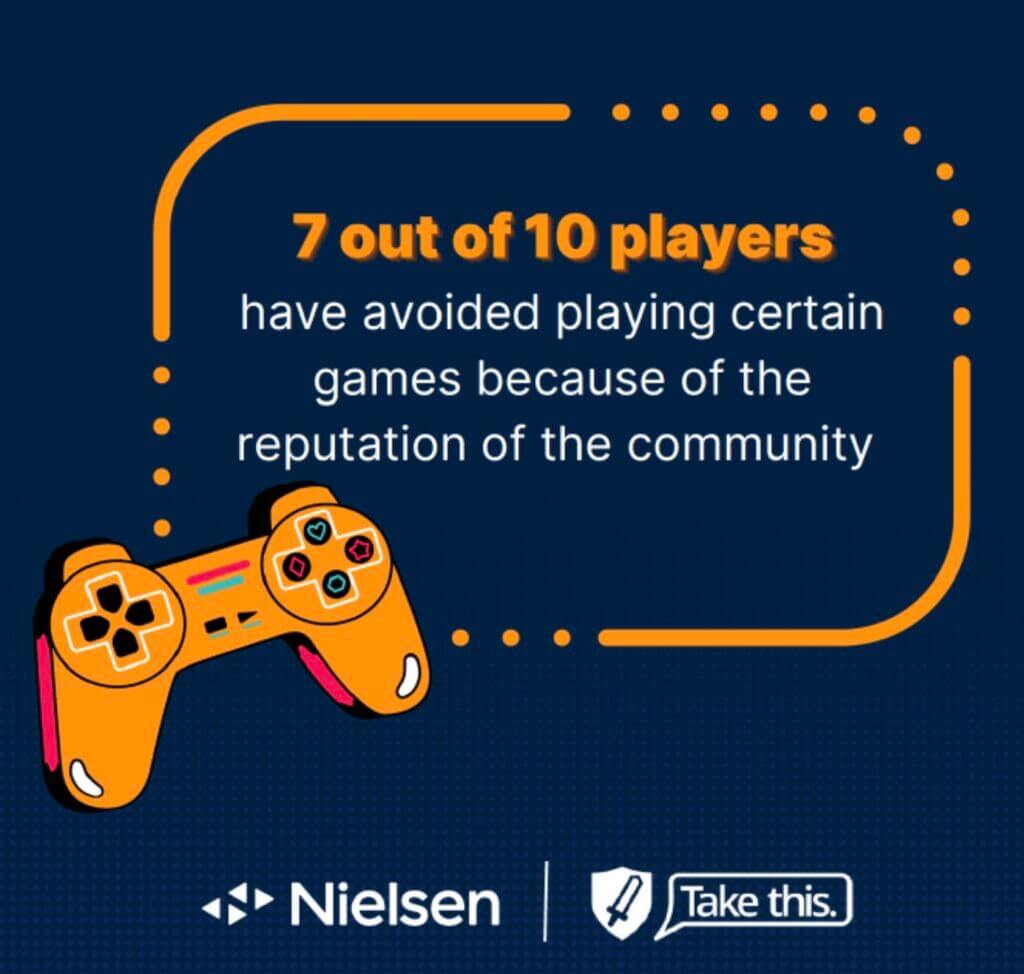
M: And what is the cause of this toxicity?
R: Well, there’s a lot of reasons that’s. One of them. One of the reasons is you see it and you think “if I’m a new player and I’m entering a space and that’s how everyone is behaving, I think OK, those are the norms of this social space. So that’s how we behave I guess.”
M continues: “So I think it’s normal to insult people here”.
R: And expect you to behave. Right. Or if somebody says a racist comment and someone else laughs, that’s what we do here. We laugh at those kinds of comments and that’s to be expected.
There’s also elements of, you know, the Internet is. It gives you the online disinhibition effect, so you feel like: “You can’t see me. You don’t know me. I can act in different ways here and it will not impact me in the real world”, or I mean “offline world”. So that makes people feel like emboldened to act and behave in different ways, whether they have adapted those beliefs and they are genuinely racist or whatever it might be.
So it’s really there’s a lot of reasons why, but that to me is important, but less important than addressing the fact that it’s become an expected and accepted behavior. whereas it shouldn’t be. And I said it in the talk like hate speech should never be an expected or accepted behavior in any environment.
Marc: I was wondering if you have any advice for the people who want to start playing video games. Where do they begin?
R: To begin: games are for everyone ! The good thing about games in 2023 is that there is every kind of game for every kind of person. Where do you play ? What do you like? Do you like word puzzles? Like my mom plays Wordle religiously.
I know it’s on your phone and some people maybe when you think game, you think League of Legends or you think Minecraft like it can be as simple as a game on your phone. And also if you were looking for a real good place to start for like families: Nintendo games with the Nintendo Switch is really the console made for families ! You can very easily find something that’s even a digital version of a board game, something that may seem more familiar to you.
Start and with Nintendo games, it’s really hard to speak to others, so.
Nintendo consoles tends to be closed systems, right? So Nintendo games are also really good for younger children who play. I love all games and all consoles, but we play a lot of Nintendo in our house because my children are young and they’re easy to pick up and they don’t tend to have any kind of online element.
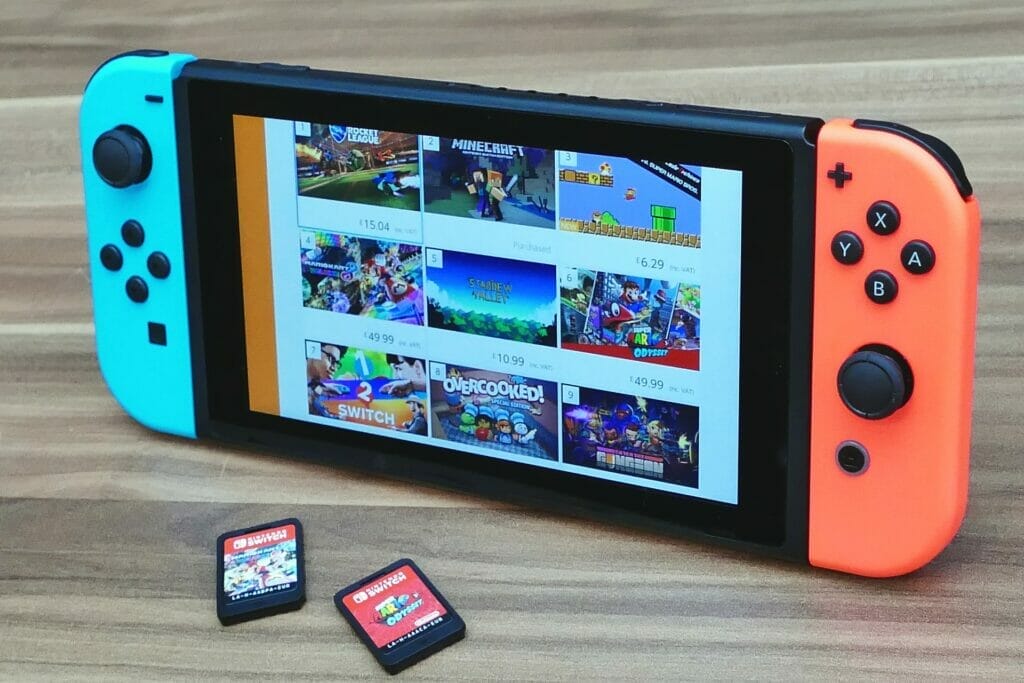
M: And what do you think parents should know more about video games in general, or do we need to set up a parental controls immediately or?
R: Yes, yes, there’s always be controls. I think what parents should see to familiarize themselves with what their kids are engaging in so. If you have adolescents, for instance, and you’ve already kind of missed the boat of like onboarding them from a young age and they’re already off in their own worlds, virtual worlds doing what they want to do. You have to ask questions and be engaged: “What are you playing? Who are you playing with? Why do you play it? Who you playing with and why are you playing it?”
The problem is not having a touch point on what your kids are doing and who they’re doing it with. Just like are you going to the Park, “Which park? Where is it? What are you doing there?” It’s the same thing you know, online and offline is a false dichotomy.
It’s the same for online games “Why you going into Minecraft? Who are you with? What are you doing right there?” Just ask questions ! 🙂
M: What is Raising Good Gamers ?
R: On Raising Good Gamers initiative, which is all about creating information and resources and projects about how to bring up a new generation of gamers who do not see this kind of behavior as normal, how do we teach digital literacy? How do we impart cultural norms on the next generation of players so we can change? So we can change the status quo that we have today.
This is an new initiative from Games for Change and Take This.
It will act in the schools and they do all kinds of things: Ted talks, they we just partnered with Jed to produce a report on mental health and teens in the metaverse. So there’s a lot of different kind of resources and projects that are coming out of it. I do believe that there will be some interfacing with schools. So more to come. It’s a constantly evolving initiative.
Marc: Thank you very much Dr. Rachel Kowert for your time and answers.
Rachel: Thank you.
If you want to follow the work of Dr. Rachel Kowert and read her books, please follow this affiliate link to her Amazon Canada bookstore.

